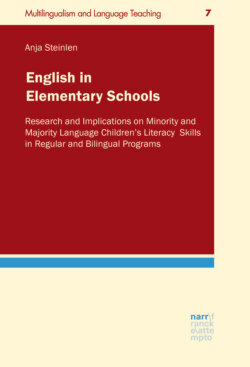Читать книгу English in Elementary Schools - Anja Steinlen - Страница 19
На сайте Литреса книга снята с продажи.
2.2.5 Studies on FL writing in regular EFL programs
ОглавлениеAs previously noted, only few studies have examined students’ English text production in the elementary school context in Germany: for example, the BIG-study (BIG-Kreis, 2015) also tested the 2,148 fourth graders on their English writing skills using tasks particularly designed for this study. The four writing tasks included copying words, writing single words to label pictures and filling out a gap text with English words and sentences where the children provided information about themselves. As expected, the children’s scores related to matching and copying single words and providing an English word to label a picture were highest; and between 54% to 71% of these tasks were solved accurately (or comprehensibly). Half of the children managed to provide adequate information in the gap text (the so-called “semi-creative task”) despite the fact that text production is usually not trained in the FL elementary school classroom. Errors in these gap texts pertained to the omission of words, incorrect plural endings or subject-verb agreement. Common misspellings in all tasks included the words <pencil> and <cheese>, which were words that the teachers had used in listening and speaking but not in writing activities. Omissions were noted for the words <bathroom, underground, scarf, Wednesday> as *<bathoom, undeground, scaf>; and transpositions for the words <white, blue, clothes, shoes> as *<wihte, bleu, colthes, shoes>. The authors concluded that the children form hypotheses and construct rules with reference to existing experience and knowledge, many based on German, as in *<shört, jelo, Freidi> instead of <shirt, yellow, Friday>. In sum, students’ English writing skills were of much lower quality than their reading skills. This may be attributable to the fact that, according to teacher interviews, writing activities were carried out only in half of their classes on a regular basis, and that almost 20% of the teachers never let their students write in English.
Steinlen & Piske (2018a) also examined English writing skills of the 73 fourth graders in the FL program. The results of the subtest for reading (PSAK, Little, Simpson & Catibusic, 2003) showed that these children generally performed at level A1 with respect to their English writing skills. This outcome is in line with the expectations by the Ministerium Baden-Württemberg für Kultus, Jugend und Sport (2004, 2016a).
As this short literature review has shown, there is a need to examine the development of FL literacy skills in regular programs, in particular because the Federal States Baden-Württemberg and North Rhine-Westfalia have recently decided to postpone the beginning of FL classes from grade 1 to grade 3 (e.g., Ministerium Baden-Württemberg für Kultus, Jugend und Sport, 2020). There have been two main reasons for this decision. First, a growing number of elementary school children show deficits in German reading, writing and arithmetic on various achievement tests. It is argued that by delaying the FL lessons, the schools gain two lessons per class level which they can use to better support these students. Second, some recent studies have indicated that in the long run (e.g., in grade 7 or 9), younger learners who started English-as-a-subject in grade 1 showed neither medium- nor long-term benefits over older learners who started in grade 3. As Fleckenstein et al. (2020) pointed out in their review, such results may also be due to the quality of FL teaching in elementary schools (with the current focus on implicit learning and not on FL literacy input); the CEFR level A1 being too low a goal; and the transition to secondary education having a strong focus on explicit learning, deductive teaching of vocabulary, grammar and metalinguistic abilities, as well as on a greater number of assessments of FL reading and writing skills. This is also one of the reasons why, in all of the studies reviewed above, the authors concluded that it is overdue to introduce systematic literacy instruction in the regular FL classroom in Germany (including, for example, an approach to teach English spelling, see also e.g., Börner et al., 2017; Burwitz-Melzer, 2010; Hempel et al., 2018). With such standards, more teachers would hopefully feel obliged to offer writing activities, which in turn would also give them more possibilities for diagnostics and differentiation in class. Students would then receive additional support for autonomous learning and more diverse opportunities to become aware of the structures of the English language, in particular with respect to FL phoneme-grapheme correspondences and the segmentation of the speech stream (BIG-Kreis, 2015, see also chapter 7). Unfortunately, the Ministries of Education of the sixteen Federal States of Germany have not yet been able to agree on a common procedure (e.g., Börner et al., 2017; Burwitz-Melzer, 2010; Hempel et al., 2018).
